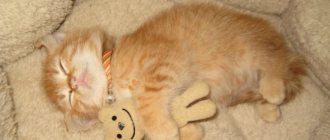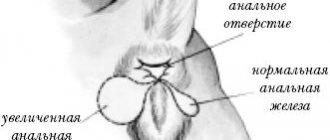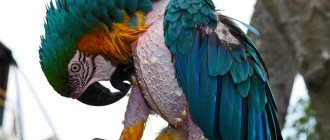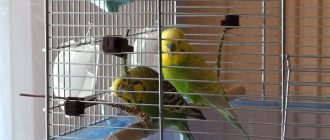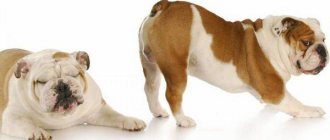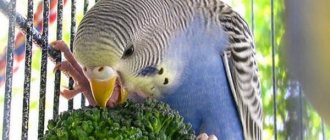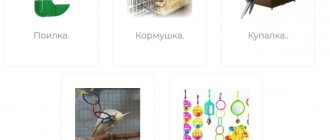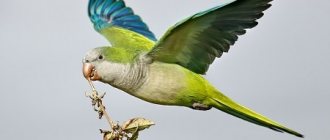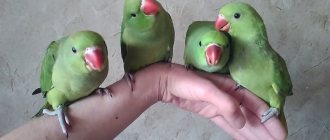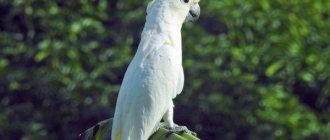An attentive breeder notes all changes in the mood of the ward. It’s just not always clear why the parrot trembles and clucks. How do you know if this behavior is normal or a cause for concern? Bird fever sometimes goes away on its own, but more often it manifests itself as a symptom of the disease. Let's look at the main causes of trembling, first aid and prevention methods.
Why does the bird sit ruffled and close its eyes?
If the owner, who notices changes in the behavior of his parrot, does not take any action, this can lead to negative consequences.
Therefore, it is advisable to immediately find out the reason for such adjustments and promptly help the wavy.
Typically, a parrot that becomes ruffled stops chirping and running quickly, and also shows apathy and does not want to play with a person.
Parasites
Pet birds can develop intestinal parasites, and this is usually associated with the purchase of low-quality food.
Internal parasites can be identified by the following symptoms:
- in the daytime the bird hides its beak in its feathers and also sits with its ruffles;
- the parrot is not active, so it prefers to sleep for a long time;
- sometimes he sleeps on a pallet, ruffled, because he cannot maintain balance on the perch.
Helminths lead to weakening of the body, and the bird also does not have enough strength to sing, play or fly. Infection usually occurs by eating low-quality or contaminated food. Sometimes the cause is poor care and infrequent cleaning of the cage.
Before installing any new accessories or equipment inside the cage, they are disinfected.
Internal parasites negatively affect the bird's health and mood, so it has no desire to preen, socialize or play. It is impossible to attract her even with goodies, so she is silent, apathetic towards games, and also sleeps a lot.
In such a situation, competent treatment is required, for which tests are taken at a veterinary clinic. There you can also buy special preparations for removing helminths.
It is also useful to read: Fleas in budgies
Colds
The cage with the wavy should be in a warm room where there are no drafts. A light breeze can cause a cold. It is accompanied by frequent sneezing, runny nose and even coughing. During this period, the bird refuses tasty food, and also often sits ruffled and with its wings spread out. With this behavior, the parrot tries to maintain warmth and energy.
Has your parrot been sick?
Yes No
To ensure your pet recovers quickly, follow these simple steps:
- air humidity increases, for which you can turn on the steam generator or simply fill buckets with water, after which they are installed in different parts of the room;
- a warm infusion of chamomile and one drop of lemon juice is made, and this drink not only reduces inflammation, but also helps strengthen the immune system;
- carrying out steam inhalations, for which chamomile flowers are poured into hot water, which is then poured into a bath installed inside the cage, and the bird, inhaling such steam, will quickly stop coughing.
If the cold symptoms do not go away after three days, you will have to seek the help of a veterinarian. Sometimes the sickly appearance is due to other reasons.
Food poisoning
Parrots gnaw not only healthy treats and twigs chosen by the owner, but also foreign objects. Therefore, sometimes symptoms of poisoning appear, and this is especially true for wavy birds, which can fly throughout the apartment during the day.
A parrot can eat a piece of paper, a leaf of a houseplant, or even a tablet.
Poisoning causes the bird to become inactive, sit at the bottom of the cage and may become tufted . She doesn't want to play or try treats. If the parrot is truly poisoned, this can lead to its death. Therefore, you need to give the bird enterosgel or give it another sorbent. It is best to immediately contact a veterinarian so that he can prescribe proper treatment.
Typically, poisoning is accompanied by other prominent symptoms, which include vomiting and diarrhea. This is often due to spoiled or low-quality food, so it is not recommended to skimp on your pet. It is advisable to buy only high-quality grain mixtures.
A parrot may become ruffled not only because of any health problems, since sometimes the reason is due to unsuitable living conditions. Often a change in a bird's behavior is associated with some external stimulus, for example, low temperature or fear.
Parrot freezes
In the room where the wavy cage is located, you need to maintain an optimal temperature. It should not be below 22 degrees. This is due to the fact that parrots in the wild live only in mild and warm climates. Therefore, if the temperature drops, this leads to a cold and apathy.
If the bird gets cold during the molting period, it will stop singing and playing, and will also sleep with its ruffles, hiding its beak in its feathers.
If the bird is ruffled and trembling, then you just need to turn on the heating or place a special heating lamp next to the cage.
Bad light
Wavys are represented by heat-loving birds that need long daylight hours. It lasts from 8 to 15 hours, but sometimes in winter it is impossible to provide such full natural light. To prevent the bird from falling into apathy, it is recommended to buy a special ultraviolet lamp , which turns on in the morning and evening. But it should not be directed directly at the wavy.
Not only the duration of light exposure is taken into account, but also its quality. Birds need large amounts of vitamin D, which is produced by the body thanks to sunlight or an appropriate device.
Fear or stressful situation
Wavys are considered shy birds, and they are afraid of strangers, loud noise and even other pets. Even just turning on the lights or music sharply can lead to stress.
You always have to observe caution on the part of the wavy immediately after its purchase.
During the adaptation period, the parrot is afraid of strangers, so it can sit with its head turned away and ruffled. It is important to ensure a peaceful and quiet environment.
When a bird is afraid, it crests and also tries to hide its beak in its feathers. With her actions she tries to hide and become invisible. At this time, the wavy's heart beats strongly, and she does not make any sounds.
If the owner notices this behavior, then it is necessary to completely eliminate external stimuli. It is advisable to turn on neutral and warm light, turn off extraneous sounds, and also talk softly to your pet. The proximity of a person with whom a trusting relationship has been established will allow the bird to relax and calm down. But if the bird hits the walls of the cage when the owner approaches, then it needs to be left alone for a while.
How to provide first aid to a parrot
Owners, having noticed signs of a pet’s illness, first of all look for ways to solve the problem on the Internet. They ask why the parrot is trembling on thematic forums, and try to treat the parrot on their own. Meanwhile, time passes, and diseases in feathered babies develop rapidly. It is impossible to delay treatment - in some cases the bird fades away within a few hours.
Separately, it is necessary to say about post-traumatic tremors. Damage to the beak, wings and other wounds cause severe pain in the parrot. If the parrot is ruffled, limping, or has a protruding wing, this could be a fracture. Take great care to transport your bird to a veterinary clinic. Treat the open wound with hydrogen peroxide, transplant the parrot into a small box with soft bedding so that it does not hurt itself during convulsions.
Is there anything I need to do?
A good owner always notices any changes in the behavior of the wavy. If the bird starts to feather its feathers and behaves very quietly, you can’t just pretend that nothing is happening. This behavior can signal serious health problems, so without treatment and surgical intervention the bird may die.
If the parrot has just been purchased, it will behave warily. After a period of adaptation and getting used to a person, his unique character is revealed. If the parrot suddenly begins to crest, then other symptoms that may signal the presence of a serious disease are initially assessed.
Next, it is recommended to do the following:
- the parrot and the cage, as well as other equipment, are inspected to make sure that the bird has not swallowed a foreign object;
- it is advisable to remember what exactly happened before the bird ruffled its feathers, for example, if there was loud screaming in the house, then such behavior may be associated with stress;
- if two parrots live in one cage, then it is advisable to remove the individual that is behaving suspiciously;
- ensures silence in the room;
- the heat lamp is turned on to warm the bird;
- sorbent or a small amount of chamomile infusion is poured into the beak through a syringe without a needle;
- if during the inspection of the bird wounds or fractures are found, they are treated with an antiseptic and also fixed with a cloth;
- To support your pet's strength, you can give 2 drops of glucose.
Using different actions, you can understand why the parrot changed its behavior. If a bird is frightened and exhausted, it ruffles its feathers. If there are no additional symptoms that indicate the presence of the disease, then you can cope with this situation on your own.
But if the bird does not react, and also develops a cough or diarrhea, then it is recommended that all manipulations be performed only after consultation with a veterinarian.
Preventing stress and illness
Protecting a parrot from emotional turmoil and illness is not so difficult. It is necessary to equip the living space with all the amenities so that the pet feels comfortable and does not get sick. The interior of the cage should contain only high-quality items, and the space itself should not be cluttered. In cramped conditions with an abundance of equipment, it is easy to get injured, after which the bird will need treatment.
When keeping at home, proper nutrition is important. Buy proven mixtures for your parrot, do not forget about the vitamin complex. Avoid overeating and obesity. If you have any unclear symptoms, consult your doctor.
A parrot does not always tremble from fear or cold. Chills appear for various reasons: from simple vitamin deficiency to dangerous psittacosis. It is important not to miss symptoms, start treatment on time and conduct annual preventive examinations with a veterinarian.
Preventive measures
Domestic parrots, despite their unpretentiousness in keeping, still require comfortable conditions. Their homeland is countries with hot and warm climates, so in captivity they need to create similar conditions. Hypothermia is dangerous for parrots: they can develop kidney disease, which is difficult to treat.
Drafts are strictly contraindicated for these birds - this is probably enemy No. 1 for them. Sharp temperature fluctuations also have a bad effect on feathered friends. They are very gentle and defenseless, susceptible to colds.
Parrots are very susceptible to infections. Owners need to take this into account. They should not approach their pets if they have contracted a respiratory disease. There is a high chance that they will infect their pets. But curing them will be very difficult, and there is a high risk of losing your feathered friend.
Pathogenesis of psittacosis
The causative agent of ornithosis enters the human body through the mucous membrane of the upper and lower respiratory tract, less often through the eyes. Then it easily penetrates the cells of the bronchi, bronchioles and alveoli, where it multiplies, destroys the cells and spreads further. In this case, inflammation develops, poisoning the body with bacterial toxins and destroyed cell debris.
As the disease progresses, the pathogen enters the bloodstream, spreads throughout the body and penetrates the organs: liver, spleen, heart, brain and joints. From them, the bacterium can again enter the bloodstream, which supports intoxication and the pathological process. As a result, specific sensitization (allergization) occurs, i.e. the body produces an increased amount of allergy and inflammation factors, and the threshold of sensitivity to allergens decreases. A secondary bacterial infection may also occur, which is accompanied by a repeated increase in temperature and increased intoxication.
If a person has a good immune system, then psittacosis usually goes away in 7–10 days, and the disease proceeds mildly or without any symptoms at all. After which protective antibodies are produced and the pathogen leaves the body within a few weeks.
Diagnosis of psittacosis
In isolated cases of psittacosis, it is difficult to make a correct diagnosis. The disease often occurs under the guise of an acute respiratory infection, and special tests, as a rule, are not performed.
Ornithosis can be suspected based on the following signs:
It is impossible to reliably determine psittacosis by symptoms. Laboratory confirmation will be required to prescribe treatment.
Laboratory and instrumental diagnostics
Differential diagnosis
Who is at risk?
The main risk group is formed by people who directly interact with birds:
- employees of veterinary clinics, pet stores and zoos,
- poultry farm workers,
- breeders,
- people involved in breeding poultry at home,
- owners of parrots and other ornamental birds living in cages.
Another risk group includes people with weakened immune systems, which increases susceptibility to chlamydia. A decrease in the body's defenses may be due to: HIV infection and AIDS, malignant tumors and their treatment (chemotherapy, radiation therapy), long-term use of glucocorticosteroids (for example, in the treatment of autoimmune diseases such as rheumatoid arthritis), as well as chronic diseases that are difficult to treat (severe heart failure, chronic pancreatitis).
The bird was attacked by parasites
Parasites, once in a bird's body, undermine its health. In addition, his behavior changes, aggression appears, he constantly itches and plucks out his wings, while the parrot constantly trembles. Why is he acting this way? Parasites (fleas, ticks, lice eaters) are very annoying to the bird and greatly deplete its body, which is why it begins to tremble. The sooner the disease is detected, the more effective the treatment will be. There are several stages of the disease when a bird is attacked by ticks:
- Initial – signs of the disease are not visible.
- Light – there are barely noticeable bumps on the dermis. The parrot itches all the time and behaves restlessly.
- Medium – the immune system weakens, the beak is involved in the damage.
- Heavy - the bird pulls out feathers, trembles, and the beak is severely deformed.
Other representatives of parasites also cause a lot of trouble for both the bird and its owners. When they are detected, the parrot is transplanted into a jar, and the cage and all the objects that were in it are treated with a special agent. Then evaporate until the smell disappears. When infected with mites, all porous objects must be destroyed, as they are a breeding ground for eggs and larvae. For treatment, the veterinarian recommends a special aversectin ointment, which is used to treat the affected parts of the body. The duration of therapy is determined individually. In addition, experts advise using this ointment as a preventive measure.
Treatment
In a room with a parrot, it is advisable to maintain a temperature of about 20–22 degrees. Additionally, an artificial heating lamp is placed next to the cage. Overheating should also not be allowed. You should drink warm water with chamomile infusion with the addition of 1-2 drops of honey or lemon juice. A runny nose is treated with inhalations. If a cold causes complications, antibiotics are used.
It is better to entrust the treatment of your pet friend to a qualified specialist. As a last resort, you can use the advice of online resources. On some forums, veterinarians provide advice. There you can post photos of your sick pet and briefly describe its condition. However, you should not overuse self-medication. You may miss time, because the disease is rapidly progressing.
Foreign body
Even a microscopic foreign particle or speck that gets into the eye causes an unbearable desire to get rid of it. A person in a similar situation rubs his “clogged” eye with his hand, and the parrot itches himself against the bars of the cage or other hard objects that are freely accessible.
Sometimes, in an attempt to get rid of a speck in the eye in any possible way, a feathered pet causes even greater damage to the organ of vision than the speck could have caused. Often, in addition to redness, the following is observed: the parrot’s eye has closed, the third eyelid has swollen and fallen out.
Signs of food poisoning
Symptoms of poisoning are largely similar, regardless of the cause. They are distinguished by intensity and severity depending on the type of toxic substance, age (poisoning in an adult is easier than in children and the elderly) and the amount eaten. However, signs of an inflammatory process in the walls of the intestines and stomach, as well as manifestations of general intoxication of the body, almost always occur.
Signs of poisoning:
- chills, diarrhea, nausea with vomiting;
- feeling unwell, malaise, weakness;
- bloating, painful cramping sensations;
- rise in temperature (usually small).
Severe poisoning, for example, with botulinum toxin, is accompanied by symptoms of damage to the nervous system:
- dry mouth and difficulty swallowing;
- muscle weakness;
- blurred vision, double vision;
- loss of coordination of movements.
Nutrition
As mentioned above, problems with paws in parrots can occur due to poor nutrition. Birds are especially affected by a lack of calcium in their diet. Many owners of ornamental birds, especially beginners, do not even suspect that their pet should have unhindered access to mineral nutrition around the clock. Only in this case can you be sure that the parrot receives the minerals it needs in full.
If a bird experiences a lack of macro- and microelements, then after a while it becomes difficult for it to control its pelvic limbs, which will outwardly manifest itself in the form of tremors. Young birds are especially susceptible to this pathology. Without diet correction, the disease will progress. Soon it will be difficult for your feathered friend to even bring his paws together, so, while sitting on the perch, he will spread his limbs wide apart. After enriching the bird's diet with microelements, recovery occurs quite quickly. Parrots can have congenital pathologies of their paws. This often happens as a result of mistakes made by the bird breeder. The most common congenital diseases include the absence of phalanges of the fingers and the abnormal structure of the pelvic limbs.
If, due to a metabolic disorder, uric acid begins to be poorly removed from the tissues of the bird, then we are talking about the occurrence of a pathology called gout. This disease affects not only the serous membranes of organs, but also the joints of the pelvic limbs of parrots. The clinical picture of gout is represented by swelling of the paws and pain when moving. However, to make a final diagnosis, a general blood test and x-ray examination must be performed.
The success of treating poultry will largely depend on an integrated approach, including not only the use of hormonal and anti-inflammatory drugs, but also a strict diet.
What causes trembling in a parrot?
Why is my cockatiel shaking? This is a question that breeders ask from time to time.
First of all, you need to find out the reason, and there are quite a few of them:
- Stress - often the bird begins to shake. The causes of fear are usually related to adaptation to new conditions. For about ten days he gets used to the new environment. At this time, it is advisable not to disturb him, give him sweets, talk affectionately and not take him out of the cage. If after this period the cockatiel has not adapted, then you should look for another reason and visit a veterinarian. During the adaptation period, the parrot is capable of behaving aggressively, for example, throwing itself at various objects in the cage. It is recommended to temporarily remove them so as not to cause more irritation to him.
- Vitamin deficiency - with a lack of vitamins, the parrot becomes apathetic, loses its appetite, and its wings shake. To correct the situation, you need to include greens, fresh fruits and vegetables in your diet. After consultation with a specialist, the use of vitamin and mineral complexes is permitted.
- Hypothermia - birds are especially sensitive to drafts and temperature changes. When ventilating the room where the cage is located, it is better to take it to another room. The minimum temperature at which a parrot feels comfortable is eighteen degrees. To warm the bird, a lamp is installed at a distance of half a meter from the cage and directed to the bottom of the cage. In addition, on one side the cage is covered with a rag so that the pet chooses a comfortable, warm place for itself and warms up. Too high a temperature is also harmful to the bird.
- Loud sounds also provoke trembling. It is not recommended to talk loudly, play music or make noise in a room with a cage. It is better for children to play outdoor games in another room.
- The next reason why a parrot trembles is a disease.
Treatment
If it is not possible to seek the help of a veterinarian, then you can do the following. In case of poisoning by toxic fumes, first of all you need to ventilate the room where the parrot is located. In other cases, liquid drugs with adsorbing action are used. They are introduced into the bird's mouth in a few drops through a pipette or syringe.
Dry preparations, such as activated carbon, are dissolved in clean water until they become semi-liquid. Then 1-2 drops are injected through a medical syringe into the side of the beak. A decoction of flaxseed can be used as a laxative. In case of diarrhea due to dehydration, the patient should be constantly given a few drops of clean water. You can feed liquid baby porridge without milk, often and little by little.
Panophthalmitis
It is expressed in infection of the eyes with viral and bacterial infections.
Subsequently, the disease causes the lenses to become cloudy, the cornea is destroyed, and the tissues become filled with blood. The eyeball protrudes from the orbit, and complete blindness is possible. Panophthalmitis is often a consequence of sinusitis, but sometimes this disease occurs in wavy patients due to injury to the eyeball. Treatment includes antibiotics, vitamin A administration, and topical application of glucose powder.
Stressful situations
If the parrot is cresting, but this is not caused by illness, the reason lies in the pet’s stressed state. The following may cause discomfort:
- the appearance of strangers in the house;
- lack of usual attention;
- unusual sounds;
- cell change;
- new relative;
- moving.
To help the bird, it is important to understand what caused the atypical behavior. Budgerigars love attention, so they get nervous when they don't get it. You can protect from extraneous noise by moving the cage to another room.
The cat or dog shows increased interest in the bird - another reason why parrots tremble. Usually, this happens until the pets get used to each other. A temporary measure would be to reduce contact: place the cage on a hill, move it to another room.
Xerophthalmia
The disease is possible due to a lack of vitamin A in the body or a chemical burn to the eye. Translated from Greek, xerophthalmia means “dry eye.”
Symptoms:
- Cloudiness, drying of the cornea;
- Hardening, desquamation, discoloration of the cornea;
- Deterioration of vision;
- Fear of light;
- Complete or partial absence of pupil constriction in bright light.
Treatment consists of a multivitamin complex with the obligatory presence of vitamin A in the form of drops or injections.
Why do the budgerigar's wings tremble?
Let's look at the reasons that cause this non-standard behavior:
- Stress. Parrots, like all birds, are quite timid by nature. Therefore, any change, for example, a new cage, a change of environment, loneliness, causes severe panic in them. It is important to figure out what is bothering the bird and help him calm down faster. You need to constantly communicate with your pet.
- Hypothermia - drafts and cold air cause shivering. Parrots do not tolerate low temperatures well, as they are accustomed to a tropical hot climate. For heating, you can use a heater, a fluorescent lamp, after throwing the material over the cage.
- Diseases - to find out why the parrot’s wings are trembling, the veterinarian will prescribe tests, based on the results of which he will select the necessary therapy. The bird may have a cold, an upset digestive system, bruises, etc.
- Nutrition – lack of minerals and vitamins also contributes to tremors. In addition, low-quality food provokes poisoning. With a balanced diet, your pet will be cheerful, cheerful and active.
Thus, the causes of trembling are very diverse.
Improper feeding
The budgerigar is an active bird, constantly on the move. A healthy parrot jumps from branch to branch, walks along the bottom and pecks grains, tears paper, but it will not sit on the floor of the cage. Then it is not entirely clear why the parrot suddenly began to spend a lot of time below. Probably his paws get tired of clinging to the perch, and it’s more comfortable to sit on the pallet. The reason for this condition is errors in nutrition: excess fatty foods or lack of nutrients.
Obesity in a parrot
You need to feed your pet not on demand, but on time, observing the portion size. If you do not adhere to dietary standards, the parrot will get used to overeating, due to which it will gain excess weight. A heavy body is a load on the legs and wings. An obese bird has difficulty moving and simply feels discomfort.
Monotonous food
On a note! It should also be noted that starvation is one of the reasons for bird weakness. The food may be of poor quality, and the parrot will not get enough of it. In some cases, exhaustion is caused by switching to another food that the pet does not like.
